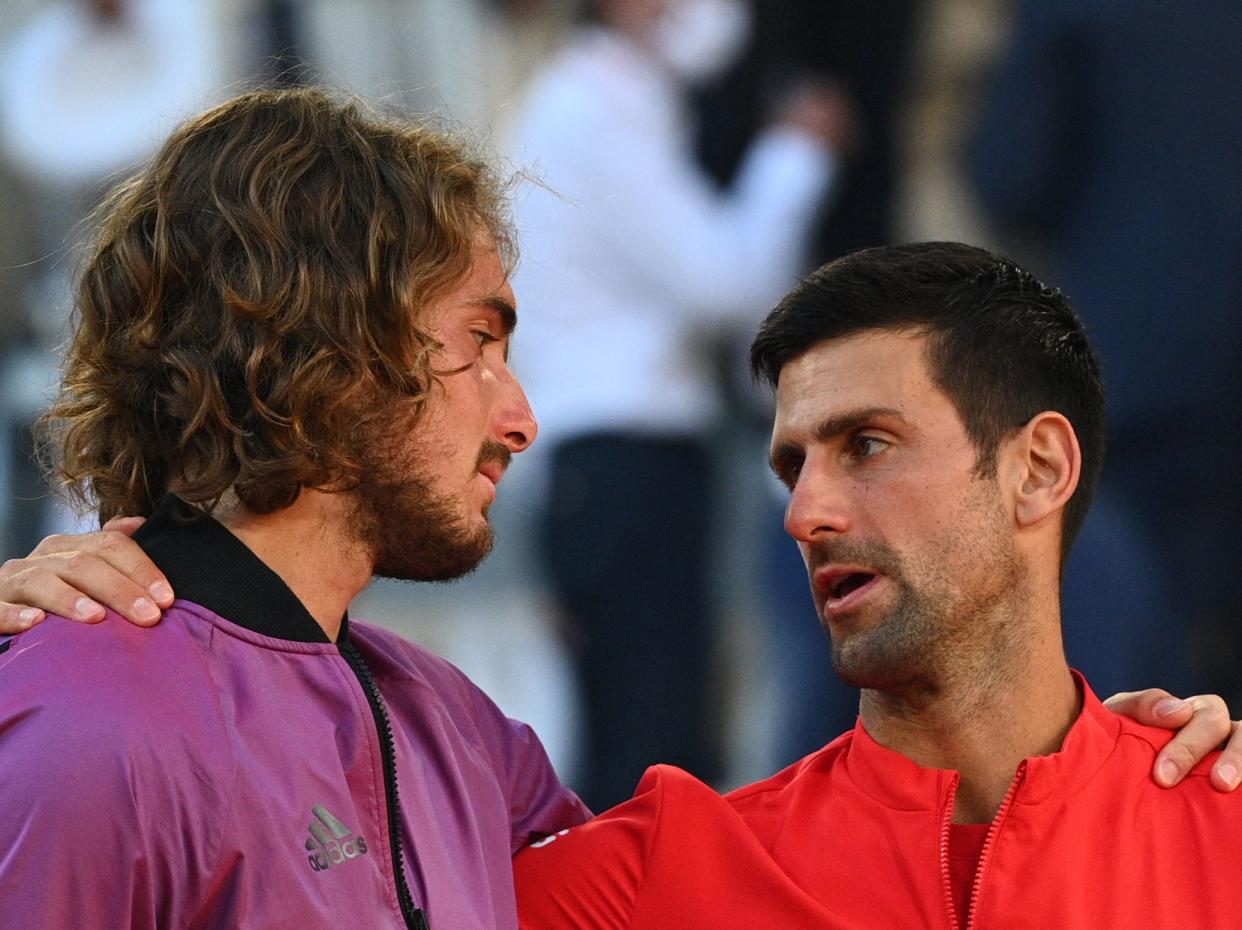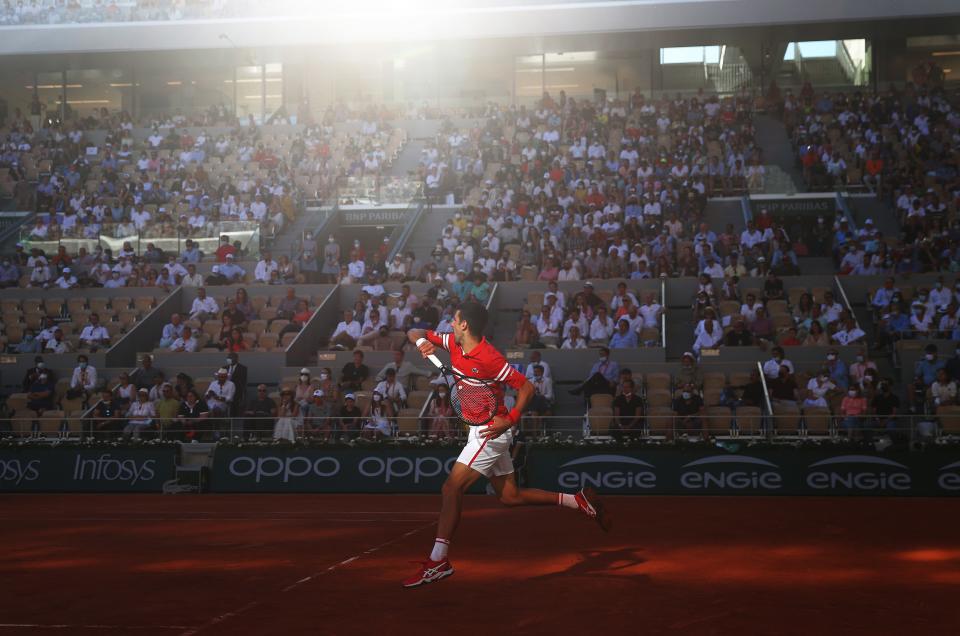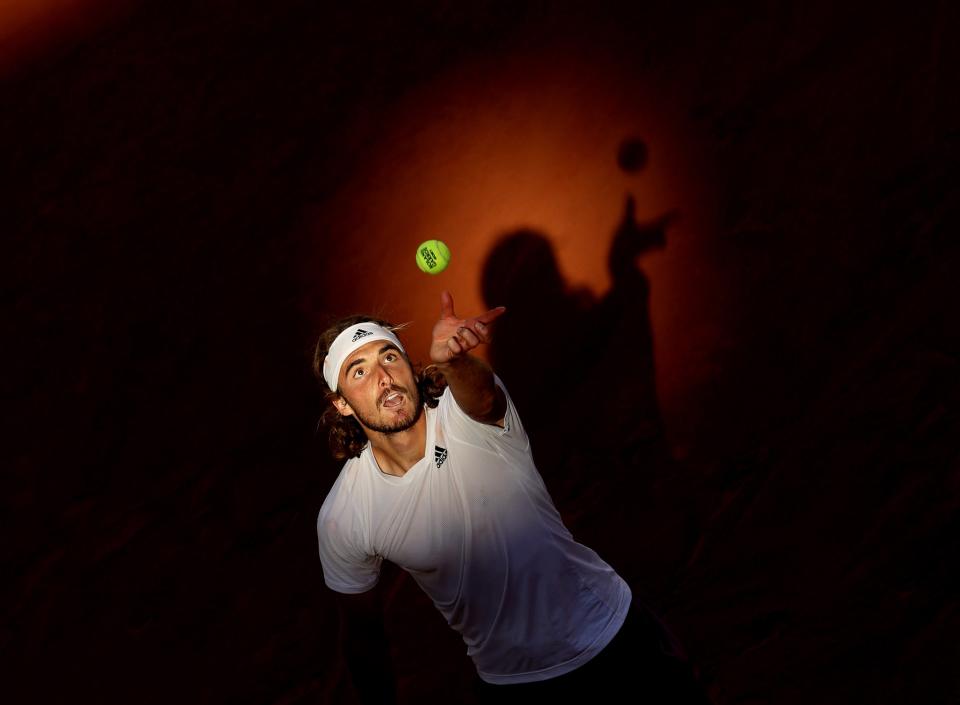Stefanos Tsitsipas rallies against fate but Novak Djokovic rallies from behind in another otherworldly showing

- Oops!Something went wrong.Please try again later.
- Oops!Something went wrong.Please try again later.
- Oops!Something went wrong.Please try again later.
As the red dust of Roland Garros settled on Court Philippe-Chatrier, some of it cascading from Stefanos Tsitsipas’ shirt, you could have sworn the French Open final had been played on Mars.
Certainly, the tennis played in Sunday’s men’s singles final was at times otherworldly, the efforts of Tsitsipas and eventual champion Novak Djokovic inhuman.
While the self-sustaining narrative of ‘Next Gen’ players failing to take the crown saw another chapter etched on the Paris clay this weekend, it feels the wrong time to criticise Tsitsipas for failing to convert a two-set lead. In his first Grand Slam final, the Greek matched Djokovic – a man playing his 29th major final – for so much of the four hours and 11 minutes spent on court.
That was the exact same amount of time Djokovic had spent on Court Philippe-Chatrier not two days earlier, as he achieved arguably the greatest win of his career – a statement not typed lightly – to beat Rafael Nadal, the French Open personified, in four sets after losing the first.
That semi-final, which saw Nadal lose at Roland Garros for just the third time ever (with Djokovic having handed the Spaniard one of those other two defeats) was one of the most magnificent matches of tennis ever played, producing one of the most startling sets of tennis ever played.
It is another reason why Tsitsipas deserves immense credit for his performance in Paris on Sunday; he threatened to tear up not only the narrative that ‘Next Gen’ players cannot beat the sport’s icons in Slam finals, but also the narrative that Djokovic vs Nadal was the true final – that Djokovic was the champion-in-waiting.
It was as if Tsitsipas, 22, and Djokovic, 34, were bound together by some elastic force, pulling and pushing one another to and from the net, sliding from one side of the surface to the other. The illusion was only broken on the occasions when one of the pair would tumble to the ground, having been forced into some inhospitable position via some unwelcome angle by the audacity of their opponent’s shot-making.
Perhaps, after Djokovic pulled a set back, there was some familiar sense of inevitability that the world No 1 would go all the way, breaking Tsitsipas’ serve just enough times to break the Greek’s heart.
Yet that is testament to the remarkable resilience and belief of Djokovic, who refused to let history repeat itself, having downed Nadal in the 2015 quarter-finals only to be sandblasted off the court by Stan Wawrinka.

Maybe the Serb’s victory over Nadal on Friday was transcendental after all. Maybe it did seal his fate as French Open champion, a feat he achieved for the second time on Sunday to become the first man in the Open era to win each Grand Slam twice.
If that’s the case, though, for a little over two hours in the Paris afternoon sun, Tsitsipas rallied not only against the world No 1 but also against fate.
Tsitsipas did not merely show up to be beaten on Sunday, a necessary but very much moveable obstacle in Djokovic’s quest for yet more history.
Sadly for the Greek, it happened anyway.
“It was strange, because my rhythm, my shots and my movement was perfect, then I felt cold and out of it,” Tsitsipas said after the match.
“I really wish I could understand why things like this happen,” the 22-year-old added, while the tennis gods smirked from above.
Across the court, one of them was rather more kind.
“I can relate to what he is going through, I understand how difficult it is losing in a Grand Slam final,” said Djokovic, who lost his first three French Open finals.

“These are the matches and kind of occasions that you learn most from. He will come out stronger and I believe he will win many Grand Slams in the future.”
Tsitsipas’ time will come, possibly before Djokovic’s is up. He must wait, however, for – as is so often the case – tennis’ Iron Man was the story on Sunday.
With one historic triumph, Djokovic closed in on another. This, his 19th Grand Slam title, moves him to within one of Nadal and Roger Federer at the top of the men’s all-time list.
What could be most crucial is that the Serb provided evidence that Nadal can no longer rely on his dominance at the French Open to pull clear of his rivals.
Clay is Djokovic’s surface now. Maybe Mars is next.
Read More
Novak Djokovic wins French Open with comeback victory over Stefanos Tsitsipas
Everything is possible – Novak Djokovic chases Golden Slam after French Open win

